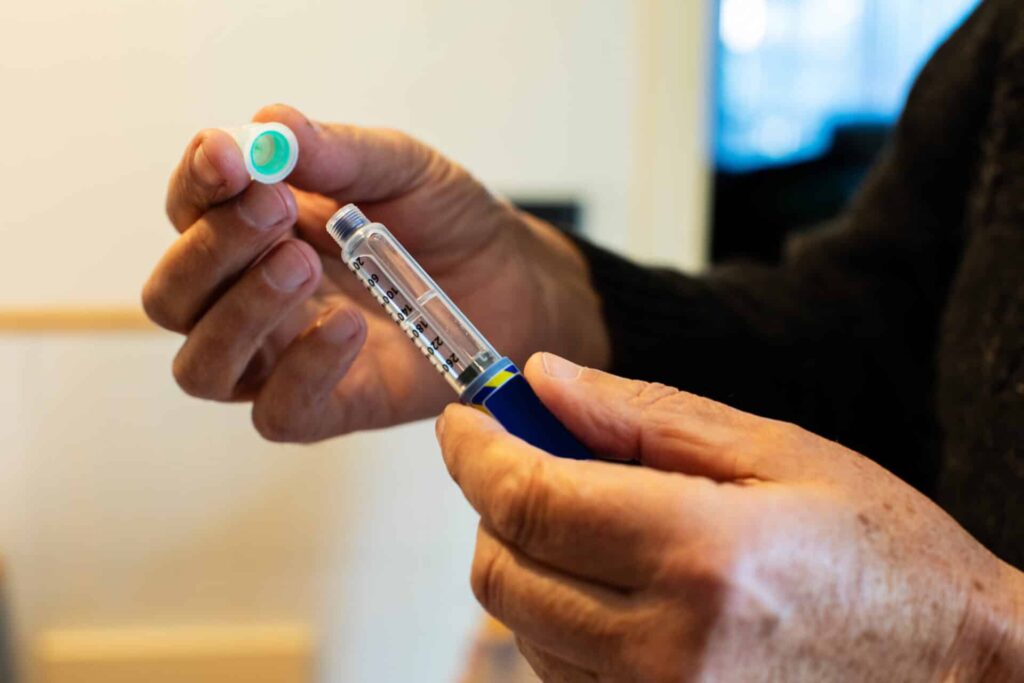Type 2 diabetes is a chronic condition that affects the way your body metabolizes sugar (glucose), an important source of fuel. While lifestyle changes and oral medications are often the first line of treatment, insulin therapy can become necessary for some individuals. In this blog, we’ll explore the why, when, and how the type 2 diabetes insulin injections benefit, providing you with the information you need to navigate this aspect of your diabetes management confidently.
Contents
Do Type 2 Diabetics Take Insulin Injections?
 Type 2 diabetes is a complex condition with varying treatment approaches, often tailored to the individual’s needs. While lifestyle changes and oral medications are typically the first lines of defense, insulin injections can become necessary in certain situations.
Type 2 diabetes is a complex condition with varying treatment approaches, often tailored to the individual’s needs. While lifestyle changes and oral medications are typically the first lines of defense, insulin injections can become necessary in certain situations.
Signs indicating Insulin Injections may be required in Type 2 Diabetes:
- Persistently High Blood Sugar Levels: When blood glucose levels remain high despite the use of oral medications and lifestyle adjustments, insulin therapy may be recommended.
- HbA1c Levels Above Target: The HbA1c test reflects average blood sugar levels over the past two to three months. If these levels are consistently above the target set by healthcare professionals, insulin may be considered.
- Beta-Cell Exhaustion: Over time, the pancreas’ beta cells, which produce insulin, can become overworked and less effective in type 2 diabetes. This reduction in natural insulin production may necessitate insulin injections.
- Presence of Diabetes-Related Complications: If complications such as neuropathy, nephropathy, or retinopathy develop, more aggressive treatment including insulin may be needed to better control blood sugar levels.
- During Pregnancy or Other Specific Conditions: In some cases, such as pregnancy or acute illnesses, insulin injections might be temporarily required for better glycemic control.
- Ineffectiveness of Other Medications: For some individuals, oral diabetes medications may not be sufficient to control blood sugar. Ultimately, leading to the need for insulin.
It’s important to note that needing insulin is not a sign of failure in managing type 2 diabetes. Instead, it’s an adaptation of the treatment plan to the evolving nature of the condition. Decisions about insulin use should always be made in consultation with a healthcare provider.
How Many Times Do Type 2 Diabetes Take Insulin Injections?
The frequency of insulin injections for individuals with type 2 diabetes can vary greatly depending on several factors. These include the severity of the disease, the type of insulin being used, the individual’s response to insulin, and their overall treatment plan. Here are some common scenarios:
- Once Daily: Some people may only need a long-acting insulin once a day. This type of insulin typically covers the body’s needs for 24 hours.
- Twice Daily: In other cases, a regimen might involve taking premixed insulin twice a day. This usually contains a combination of both short-acting and intermediate-acting insulins.
- Multiple Daily Injections (MDI): More intensive regimens can involve multiple daily injections, often including a mix of long-acting insulin once or twice a day and rapid-acting insulin before meals. This is sometimes known as a basal-bolus regimen.
- Insulin Pump Therapy: Although more common in type 1 diabetes, some people with type 2 diabetes might use an insulin pump, which continuously administers insulin throughout the day based on the programmed need.
The exact regimen is tailored to the individual’s needs, lifestyle, and how their blood sugar levels respond to different treatments. People with type 2 diabetes need to work closely with their healthcare provider to determine the best insulin therapy plan for their specific situation.
How Do Type 2 Diabetes Insulin Injections Work?
 Insulin injections play a crucial role in managing type 2 diabetes, especially when blood sugar levels cannot be controlled by diet, exercise, and oral medications alone. Here’s how they work:
Insulin injections play a crucial role in managing type 2 diabetes, especially when blood sugar levels cannot be controlled by diet, exercise, and oral medications alone. Here’s how they work:
- Lowering Blood Glucose: Insulin injections help lower blood glucose levels by performing the role of naturally produced insulin, allowing glucose to enter cells and be utilized as energy.
- Types of Insulin: There are various types of insulin, categorized by how quickly and how long they work. Rapid-acting insulins start working within minutes and last for a few hours, while long-acting insulins take longer to start but maintain their effect for up to 24 hours or more.
- Mimicking Natural Insulin Production: The goal is to mimic the body’s normal insulin patterns. Rapid-acting insulin can be used at mealtimes to handle the spikes in blood glucose that occur after eating, while long-acting insulin helps manage glucose levels throughout the day and night.
- Adjustment of Doses: Insulin doses are adjusted based on blood sugar monitoring. This can be influenced by factors like diet, physical activity, illness, or stress.
- Injection Sites: Insulin is typically injected into the fatty tissue under the skin, often in the abdomen, thigh, or upper arm, where it can be absorbed into the bloodstream.
- Avoiding Complications: Regular use of insulin injections can help avoid or delay diabetes-related complications by maintaining blood glucose levels within a target range.
Managing type 2 diabetes with insulin injections requires balancing insulin doses with food intake and physical activity levels. This balance is crucial to avoid hypoglycemia (low blood sugar) or hyperglycemia (high blood sugar). Both of these can be dangerous if not managed properly. Insulin therapy in type 2 diabetes is tailored to each individual’s needs and is often adjusted over time as the condition changes.
Benefits And Risks Of Type 2 Diabetes Insulin Injections
Type 2 diabetes insulin injections come with both benefits and risks. Understanding these can help individuals make informed decisions about their diabetes management plan in collaboration with their healthcare providers.
Benefits
- Improved Blood Sugar Control: Insulin is highly effective in lowering blood glucose levels, which helps in reducing the symptoms of high blood sugar and the risk of complications.
- Reduced Risk of Complications: Better glucose control can decrease the risk of long-term complications such as neuropathy, retinopathy, kidney disease, and cardiovascular issues.
- Flexibility in Treatment: Insulin therapy can be adjusted to suit individual lifestyles, eating habits, and glucose patterns, offering a personalized approach to diabetes management.
- Potentially Reversible Beta-Cell Rest: In some cases, insulin therapy can give the pancreas a rest, potentially improving its ability to produce insulin naturally.
Risks
- Hypoglycemia (Low Blood Sugar): One of the most common risks associated with insulin use is hypoglycemia, which can occur if insulin doses are too high, food intake is too low, or physical activity is increased without appropriate adjustments.
- Weight Gain: Some people may experience weight gain when they start insulin therapy, as the body begins to use glucose more effectively.
- Injection Site Reactions: Reactions at the injection site, such as redness, swelling, or pain, can occur, although they are usually minor.
- Cost and Accessibility: Insulin therapy can be expensive, and access to insulin can be challenging in some regions. And, making it a significant consideration for many people.
- Psychological Impact: Some individuals may experience anxiety or discomfort about self-injecting and managing a more complex treatment regimen.
- Insulin Resistance: Over time, some individuals may require higher doses of insulin due to increasing insulin resistance.
The decision to start insulin therapy should involve a detailed discussion with a healthcare provider, considering the individual’s specific medical history, lifestyle, and personal preferences. Regular monitoring and adjustments to the treatment plan are essential. This further helps to minimize risks while maximizing the benefits of insulin therapy.
Is It OK To Skip Insulin Injections?
 Skipping a type 2 diabetes insulin injection is generally not recommended, as it can lead to significant health risks. Insulin is a critical component of diabetes management, particularly for those who cannot maintain blood sugar levels through diet and oral medications alone. When a dose of insulin is missed, blood glucose levels can rise rapidly, leading to hyperglycemia (high blood sugar).
Skipping a type 2 diabetes insulin injection is generally not recommended, as it can lead to significant health risks. Insulin is a critical component of diabetes management, particularly for those who cannot maintain blood sugar levels through diet and oral medications alone. When a dose of insulin is missed, blood glucose levels can rise rapidly, leading to hyperglycemia (high blood sugar).
Prolonged hyperglycemia can increase the risk of serious diabetes complications, such as diabetic ketoacidosis (in extreme cases), heart disease, kidney damage, nerve damage, and vision problems. Additionally, inconsistent insulin administration can make it more difficult to manage and predict blood sugar levels, complicating overall diabetes control.
In situations where a dose is missed, it’s important to have a plan in place. And it should be discussed with a healthcare provider. It’s crucial not to double the next dose as a way to compensate for the missed one, as this can lead to hypoglycemia (low blood sugar), another dangerous condition. Instead, the focus should be on returning to the regular dosing schedule as safely as possible.
Conclusion
In conclusion, managing type 2 diabetes effectively often involves a combination of lifestyle changes, oral medications, and sometimes insulin injections. Type 2 diabetes insulin injection plays a crucial role in controlling blood sugar levels and reducing the risk of complications associated with diabetes. While it’s important to understand the benefits and risks and the need for regular monitoring and adjusting dosages, it’s also vital to remember that skipping insulin doses can lead to serious health issues.
Overall, working closely with healthcare providers to create and follow a personalized diabetes management plan is key to living a healthy and balanced life with type 2 diabetes. Do you want to get rid of diabetes? Join our online diabetes treatment program and reverse Diabetes naturally through lifestyle changes such as a Personalized Diet plan, Exercise, Yoga, dieticians, and health coaches.

